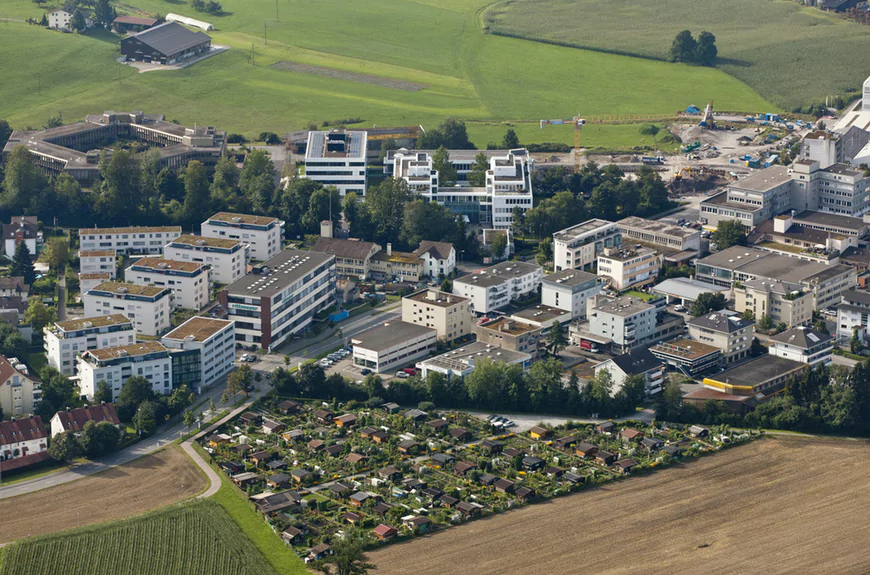Switzerland is home to the headquarters of several world leaders in raw materials, such as Glencore, based in the canton of Zug. Keystone / Alessandro Della Bella Home to big players in the raw materials, food and chemicals industries, Switzerland boasts one of the world’s highest concentrations of multinational headquarters. Multinationals play an important role in the Swiss economy, providing both jobs and tax revenues. In 2018, the Federal Statistical Office found nearly 29,000 businesses in the country formed part of a multinational group, employing a total of 1.4 million people. More than 16,000 of these businesses — representing 920,000 jobs — have their headquarters in Switzerland. Numerous firms also have their European headquarters or major business units
Topics:
Swissinfo considers the following as important: 3.) Swiss Business and Economy, 3) Swiss Markets and News, Business, Featured, newsletter
This could be interesting, too:
Nachrichten Ticker - www.finanzen.ch writes Die Performance der Kryptowährungen in KW 9: Das hat sich bei Bitcoin, Ether & Co. getan
Nachrichten Ticker - www.finanzen.ch writes Wer verbirgt sich hinter der Ethereum-Technologie?
Martin Hartmann writes Eine Analyse nach den Lehren von Milton Friedman
Marc Chandler writes March 2025 Monthly

Switzerland is home to the headquarters of several world leaders in raw materials, such as Glencore, based in the canton of Zug. Keystone / Alessandro Della Bella
Home to big players in the raw materials, food and chemicals industries, Switzerland boasts one of the world’s highest concentrations of multinational headquarters.
Multinationals play an important role in the Swiss economy, providing both jobs and tax revenues. In 2018, the Federal Statistical Office found nearly 29,000 businesses in the country formed part of a multinational group, employing a total of 1.4 million people.
More than 16,000 of these businesses — representing 920,000 jobs — have their headquarters in Switzerland. Numerous firms also have their European headquarters or major business units on Swiss soil.
Some of these multinationals are major players on the international stage. Fourteen companies based in Switzerland were listed in Forbes’ most recent ranking of the world’s 500 businesses with the highest turnover, all sectors combined. They employ more than 1.2 million people around the world.
Other large Swiss multinationals would also rank high on this list – if they released their turnover figures. Take the example of Vitol, with its annual turnover of $225 billion (CHF205 billion); if Vitol was a country, it would be the 52nd largest economy in the world, sandwiched between Peru and Greece.
Advantages – and responsibilities
Half of the companies in the Forbes ranking are held by Chinese and American firms, but Switzerland claims the greatest concentration of “Global 500” businesses relative to its population.
Switzerland offers many advantages to large businesses: economic stability, a strong financial sector, qualified workers, a geographic location at the heart of transport networks – and an advantageous tax system and flexible regulations.
But civil society organisations want to see multinationals take responsibility for their actions as well. A proposal, called the ‘responsible business’ initiative, comes before Swiss voters on November 29. It seeks to make Swiss companies accountable for their business activities abroad that threaten human rights and the environment.
What’s a multinational, and which ones are affected by the initiative?
The Federal Statistics Office (FSO) makes a distinction between “Swiss multinationals”, which have their headquarters in the country, and “foreign multinationals”, which are present in the country but controlled by a foreign entity.
There is no universal definition of what a multinational is. In the minds of most people, multinationals are very big international companies, listed on the stock exchange and known to the wider public.
This is only part of the reality. Together with Eurostat, the FSO considers that a company is a multinational when it has at least two legal entities located in different countries. According to this definition, small and medium-sized enterprises (SME) could be multinationals.
The opponents of the “responsible business” initiative are worried that SMEs would be affected by this proposal. But the text allows for the due diligence burden to be conditional on the size of a business, and for an SME to be excluded unless if it is active in risk sectors.
The text only concerns businesses that “have strong impacts in countries where the regulatory context, in terms of human rights and the environment, is below internationally accepted standards,” says Paul Dembinski, an economics professor at the University of Fribourg. “To sum up, it is about businesses that have significant activities in developing countries.”
End of insertion
The NGOs behind the initiative want Swiss companies, as part of their due diligence obligations, to review their supply chain to identify potential risks to people and the environment. Firms would have to take effective measures to combat negative impacts and report regularly on what has been implemented.
The global raw materials giants are Swiss
With more than 500 companies active in the sector, the small Alpine nation is a leading global platform for trade in raw materials, such as petrol, metals, minerals, and agricultural products. Switzerland is home to the headquarters of the sector’s world leaders — Vitol, Glencore, Trafigura, Mercuria, and Gunvor — which alone employ 180,000 people around the world and are active in dozens of countries across all continents.
Other major players in the sector also have a presence in Switzerland, such as Cargill International, BHP, Koch, Bunge or Louis Dreyfus Company. Most of these companies have diversified their activities across the supply chain, by purchasing mines or exploration licences, for example.
If there is a Swiss trading tradition that dates back to the first half of the 19th century, the country has also recently attracted several large traders thanks to a “campaign of seduction by the authorities of certain cantons, notably Zug and Geneva, over the last 20 years,” explains Paul Dembinski, an economics professor at the University of Fribourg. Today, these sprawling multinationals are among Switzerland’s largest businesses.
Major players in food and pharma
Swiss heavyweights can be found in a range of other sectors. They include Nestlé, the world’s top food and drinks company; Roche and Novartis, leaders in the pharmaceutical industry; Lafarge Holcim, an important player in the building materials sector; and ABB, active in the machinery industry.
Thanks to Richemont and Swatch Group, two of the ten largest luxury groups in the world are Swiss, according to the Deloitte Global Powers of Luxury Goods report. Switzerland is also home to the world’s second-largest temporary employment service (Adecco), the world’s second-largest shipping company (MSC) and the second-largest third-party logistics supplier (Küne + Nagel International).
Coop and Migros are among the top 50 in the Deloitte ranking of the world’s 250 major retailers. In the global chemicals industry, Syngenta ranks 29th, and first in the pesticides segment.
Some industries particularly at risk
Some of these large businesses are more exposed than others to the risk of violating human rights or environmental norms. The scandals revealed in recent years by the NGO Public Eye have, for example, implicated subsidiaries of Glencore, Lafarge Holcim and Syngenta in Africa, South America and Asia.
“The risks are primarily concentrated at two levels: the nature of the activities and the contexts in which the multinationals operate,” says Géraldine Viret, spokesperson for Public Eye, which supports the responsible business initiative.
“The raw materials sector is particularly sensitive,” as is the agrochemicals industry, according to Viret. An annual ranking by the Institute for Human Rights and Business (see box below) adds the textile industry and information technology and communications products manufacturing to the list of “sensitive” sectors.
Few multinationals satisfy basic human rights requirements
Each year, the Institute for Human Rights and Business (IHRB) evaluates 200 of the world’s largest publicly listed companies according to a number of human rights indicators. It concentrates on four “high-risk” sectors: agricultural products, clothing, extractive industries and IT/communication products manufacturing.
According to its annual report, a lot of big businesses cannot show that they satisfy basic human rights norms under the UN principles. Four Swiss multinationals appear on the list and obtain mediocre scores. They are Nestlé (55/100), Glencore (46/100), Lindt & Sprüngli (6/100) and TE Connectivity (less than 5/100).
End of insertion
Aside from the “devastating” environmental problems linked to these activities, “we are often talking about fragile countries, where the population lives in widespread poverty, despite the wealth of its soil, and where the state is unable to protect its citizens,” explains Viret. “Not to mention the economic power [of these multinationals] and their influence, which is often greater than that of the states in which they operate.”
Public Eye believes Switzerland, as the home-base of firms in these high-risk sectors, has a central role to play in adopting laws on corporate responsibility. For the NGO, it is about aligning the responsibility of these companies with their power.
Translated from French by Sophie Douez
Tags: Business,Featured,newsletter








